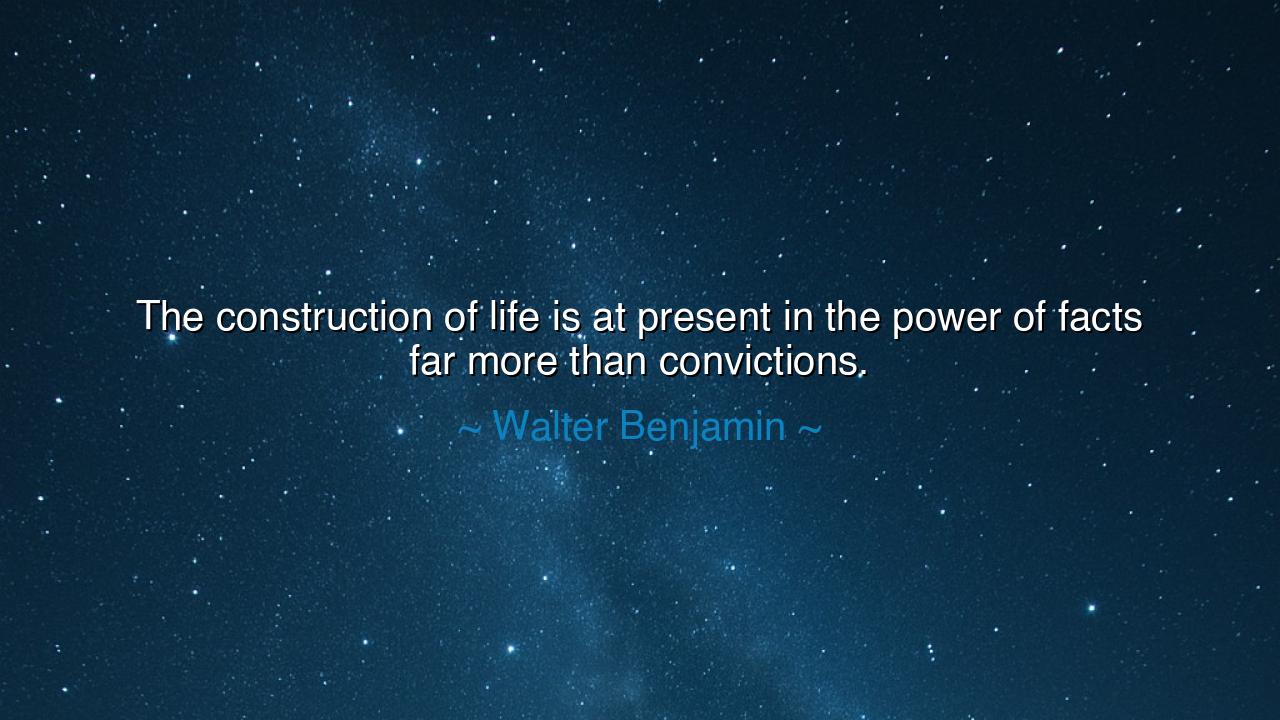
The construction of life is at present in the power of facts far
The construction of life is at present in the power of facts far more than convictions.






In the words of Walter Benjamin, “The construction of life is at present in the power of facts far more than convictions,” we are confronted with a truth that pierces the illusions of our age. The facts—cold, measurable, and undeniable—shape the course of nations and individuals more strongly than the convictions that stir the heart. Once, belief alone could ignite movements, command loyalty, and build kingdoms; now, it is the sheer weight of information, data, and material conditions that directs the flow of life.
The meaning of his words is rooted in the shifting balance between spirit and reality. Convictions arise from ideals, from visions of how the world ought to be. Yet Benjamin reminds us that life as we live it bends less to the fires of belief and more to the immovable structures of circumstance. Poverty, war, technology, and economy—these facts press upon us more heavily than even the noblest convictions, forcing men and women into choices they did not dream of making.
History gives us the tale of the French Revolution. The convictions of liberty, equality, and fraternity filled the hearts of the people, but it was the fact of hunger, the price of bread, and the failure of the harvests that truly ignited the storm. Conviction gave the revolution its banner, but fact gave it its urgency. Without the force of reality pressing upon the people’s bellies, the lofty ideals might have remained only whispers in pamphlets.
Benjamin’s insight is both warning and wisdom. To live only by facts is to risk losing vision, reducing life to survival and measurement. Yet to live only by convictions is to risk blindness, ignoring the ground upon which we stand. The construction of life, then, must be built upon both—the stone of fact and the mortar of conviction. But he laments that in his time, and perhaps in ours, the stone outweighs the mortar, and dreams struggle to hold their place.
So let this lesson endure: do not despise the facts, for they are the foundation of the real. But do not abandon convictions, for they are the fire that gives life meaning. As builders of life, we must learn to balance the immovable weight of reality with the soaring call of ideals, lest we become slaves to one and deaf to the other. In this balance, civilization endures; without it, the world becomes either too rigid to breathe or too hollow to stand.






TLTa Lan
Walter Benjamin’s observation feels very relevant today, where facts seem to be the driving force behind many decisions in our personal and public lives. While it’s important to base decisions on facts, I wonder if the emphasis on data is diminishing the role of personal convictions, which can be just as vital in guiding our actions. Do you think society would be better off if we allowed our beliefs to have more influence over our choices?
TKLINH TA KHANH
It’s interesting how Walter Benjamin points out the power of facts in shaping our lives, especially in today’s digital and information age. While facts are important for making informed decisions, it makes me wonder if we’ve become too detached from our personal values and beliefs. Are we allowing data to dictate our actions too much? Can there be a balance between facts and convictions in modern life?
TSThanh Son
Walter Benjamin’s quote really makes me question how much of our lives are shaped by the information we have at hand rather than our deeper convictions. In an age of data-driven decisions, it feels like facts are often used to shape narratives or justify actions, sometimes overlooking the human element. Do you think we’ve become too reliant on facts and lost the essence of conviction and personal belief?
DTNguyen Duy Tung
I find Walter Benjamin's perspective quite thought-provoking. In today’s world, it seems like facts and data have become the foundation of most decisions, especially in areas like politics, business, and even personal life. But I can’t help but feel like there’s something missing when convictions, emotions, and beliefs are sidelined. Do you think we’re losing something important by prioritizing facts over personal values and convictions?
HHi
Walter Benjamin’s statement seems to reflect the dominance of facts and data in shaping modern life. It’s almost as though our convictions and beliefs have taken a backseat to cold, hard evidence. I wonder if this shift is making people less connected to their emotions and deeper values. Do you think this reliance on facts over convictions is shaping our society in a positive or negative way?